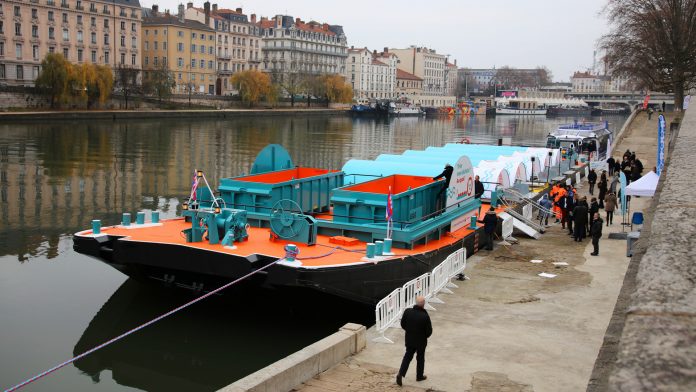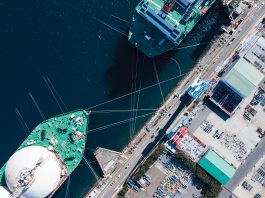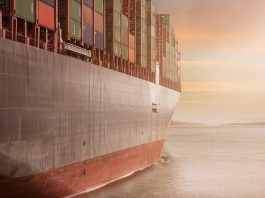Seemingly unappealing inland ports are being called upon to use traditional modes of transport in innovative and sustainable ways in order the tackle our 21st century challenges.
Inland ports most likely do not come straight to mind when we talk about innovation. Traditionally catering to barges and heavy industries, inland ports are rather associated with old polluting vessels lacking the flexibility we expect of the 21st century.
However, perceptions often fail reality. Inland ports are located along the rivers, canals and lakes in many of Europe’s most iconic cities such as Brussels, Paris, Vienna and Budapest. Historically, these cities have owed their growth to the logistic benefits offered by inland waterway transport. Yet today, cities are facing mobility and logistical challenges. As urbanisation continues, local governments are under pressure to increase the quality of life in their cities. Heavy lorries are being barred and more and more “car-free” zones are being created. At the same time, the movement of people and goods has become more and more demanding. All the while, the European Green Deal goals requires the decarbonisation of transport.
Being part of these metropolitans and continent spanning logistical-chains, the seemingly unappealing inland ports are being called upon to use traditional modes of transport in innovative and sustainable ways in order the tackle our 21st century challenges.
Port of Paris: supplying cities
Located along the iconic Seine, Paris is currently playing an innovative role in inland waterway transport with a number of projects concurrently taking advantage of inland waterway’s untapped potential. For instance, the Port of Paris works with partners on floating warehouses to ship parcels deep into the city. These are then delivered by clean cargo bikes and vans. All of this aims to reduce lorries in the inner city and reduce congestion.
E-commerce has given consumers many more choices but poses a real challenge for transport and urban areas. The rising amount of small shipments leads to more congestion. The Port of Paris is committed to bring parcels as deep as possible into the city via the Seine river to avoid unnecessary traffic jams. Self-unloading ships with on-board handling equipment (cranes or ramps for vehicles) will function as parcel depots and floating stocks. At the same time, the food group Casino is using floating warehouses to supply Franprix supermarkets across the city leading to 4,000 less lorries annually.
Port of Lyon: River’tri
Moving south, Lyon has always been an important location in Europe’s waterway network given its location at the confluence of the Rhone and Saone rivers. It has the particularity of being located at the heart of the city and must adapt to urban pressure while maintaining an industrial orientation As a result, it has become a leader in waterway innovation in the past few years. One example of which is the “River’tri” project, established to support circular economy principles.
Citizens are invited to take all their waste products, from carpets to batteries, mattresses to cardboard, to a quay at the centre of the city, to be sent directly to industrial sites at the Port of Lyon. This initiative will soon be further greened with the use of a hydrogen-powered pusher, developed under the European project “FLAGSHIPS”. The boat will be supplied with green hydrogen in the “Quai des energies”, a multi-renewable energies supply station located on the Port of Lyon. With capacity for 3,000 tonnes of waste per year, the project eliminates a significant amount of congestion, noise and air pollution, as well as olfactive pollution typical of traditional waste depots. In this way, inland waterway transport enables green city logistics, facilitating the uptake of clean economic processes and establishing inland ports as hubs of the circular economy.
Port of Brussels: Bouwmaterialendorp
One of the largest and most problematic transport flows in urban areas is that of building materials. As urbanisation increases the need for more building projects, with accompanying logistical challenges. The transport of building materials requires large lorries, often have to be transported over long distances leading to congestion in cities. The Port of Brussels decided to tackle this by building a Building Materials Village (Bouwmaterialendorp). Located in the port, the BMV is accessible by inland waterway vessels delivering building materials of all types and requirements. These are then stored awaiting collection by local construction companies. Instead of a lorry having the travel many kilometres to deliver the necessary materials to the sites, materials can now be collected in the city centre (where the port is located) and delivered within a handful of kilometres. This synergy of inland waterways and local logistics allows for the number of lorries entering the city to be reduced while also improving the local air quality levels.
The SeaBubbles programme
Inland ports are not only offering innovative solutions for goods but also passenger transport. The SeaBubbles programme is looking at inland waterways as a solution for congestion from another perspective: passenger transport. The project brings a human focus together with innovation in automation and clean fuels to make clean, quick travel within cities a viable, commercial option. With the number of city dwellers only set to increase, congestion will pose more and more of an issue regardless of the cleanliness of the vehicles on the streets. Inland waterways thus provide a natural solution, given its huge amount of untapped capacity. While still in development stage, the growth of the project is remarkable; around 50 cities have already expressed interest in integrating the programme to their urban landscape. This forgotten element of inland waterways – as a key part of a city’s commuter transport network – will be one of the most interesting innovations going forward not only for the inland waterway sector, but for city logistics as a whole. Innovation however thrives under continued support.
Port of Vienna: Thinkport VIENNA
Thinkport VIENNA, a project from the University of Natural Resources and Life Sciences and the Port of Vienna, focuses on the issues associated with urbanisation and the related need for the development of smart logistics systems. However, the project goes a step further in reaching out to all the relevant stakeholders – urban planners, politicians, practitioners, researchers and port and industry experts – to establish a platform that ensures the effectiveness and durability of innovative solutions. The Port’s involvement in the project offers the practical added value of a ‘test zone’ for new technologies, services and processes: academic and policy experts have the possibility to test, on-the-ground, equipment and multimodal transhipment processes. Innovation is needed from a holistic perspective, something the project thinkport VIENNA is eager to achieve.
Open Innovation Challenge
These examples only show a handful of innovations currently being developed in inland ports. Up until now, most inland ports have been working on these innovations in isolation with only limited cross-pollination between themselves but also other sectors and disciplines. Innovation and the subsequent market up-take thrive off of the exchange of ideas. As such, the European Federation of Inland Ports, together with thinkport VIENNA are holding an Open Innovation Challenge. At this challenge we invite innovators from all sectors to come and present their ideas that could support inland ports in:
- On site innovation potential (power supply, technology, processes, services for companies, employees (commuters) and cities and business models);
- Innovative supply infrastructure for connected smart cities (services and infrastructures for smart cities, integration into city logistics);
- Inland waterways as supply routes for smart cities (vessels, alternative fuels, port area, services, infrastructure etc.); and
- The role of inland ports as innovators for smart cities (energy production, logistics services, waste disposal etc.)
Turi Fiorito
Director
European Federation of Inland Ports
turi.fiorito@inlandports.be
Tweet @EFIPSecretariat
www.inlandports.eu
Please note, this article will also appear in the first edition of our new quarterly publication.





